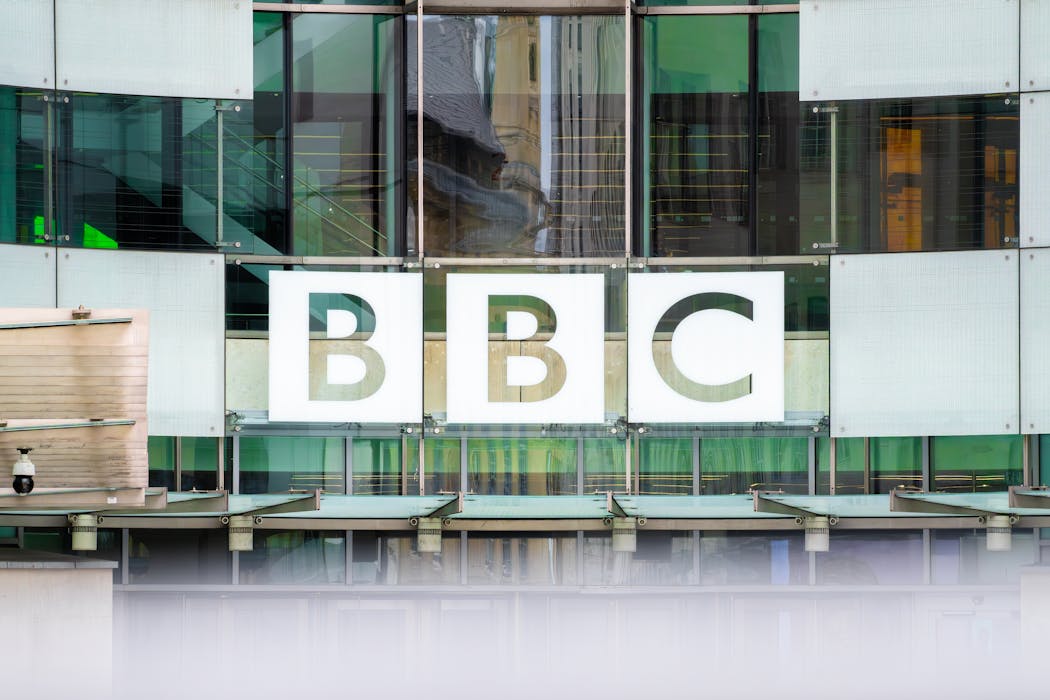
The sudden departure of the BBC’s director general and head of news marks a moment of real consequence for British public service broadcasting.
Tim Davie and Deborah Turness’s resignations followed controversy over an inaccurately edited clip in a BBC Panorama documentary about Donald Trump. Opponents of the BBC seized on this as further evidence of widespread bias at the broadcaster. It has now become a flashpoint in the wider political and cultural battles surrounding the corporation.
The resignations come as the BBC enters a decisive period. The renewal of its royal charter in 2027 will define the corporation’s funding model and public purpose for the next decade. At the same time, the BBC faces a hostile political climate, sustained financial pressure and a rapidly fragmenting audience.
Recent controversies – from the Panorama edit to earlier disputes over social media conduct and political coverage – have reignited debate about the broadcaster’s duty of “impartiality”. Yet in today’s febrile information climate, it is fair to ask whether that duty remains fit for purpose.
Media regulator Ofcom defines impartiality as “not favouring one side over another”, but also as ensuring “due weight” is given to the evidence. That distinction matters: impartiality is not the same as neutrality. It demands that news be fair, accurate and proportionate – not that every claim be treated as equal.
Impartiality under pressure
The BBC’s crisis, as academic and commentator Adrian Monck observes, is not simply a matter of poor governance, but “the sinking of a ship of the twentieth century British state, dependent on conditions that no longer really exist”.
Impartiality as a professional norm took shape in the mid-20th century, when it became central to the BBC’s mission under its 1947 royal charter. It emerged in a period when there was still broad agreement on shared facts, and a civic space where citizens could reason together even when they disagreed.
This era has broken down over the past 20 to 25 years, with the rise of digital platforms and populist politics that eroded traditional journalistic gatekeeping. Today’s information environment is shaped by technology companies, populist leaders, political strategists and partisan media outlets. All have strong incentives to create confusion and distrust. When political figures deny evidence, distort facts or lie as strategy, reporting their claims as equal to verified facts is not neutrality or impartiality, it is distortion.
Davie understood this tension. Under his leadership, the BBC tried to clarify the meaning of impartiality, strengthen editorial standards and reinforce trust in its reporting.
Yet the organisation, like many news outlets worldwide, is caught in a bind: accused of bias from both the left and the right – and while in the past this might suggest a fair balance, in today’s climate it is often weaponised.
As the sociologist Niklas Luhmann has noted, the function of news is to create a shared reality, a minimal consensus about what exists and what matters. When that consensus collapses, the public sphere itself begins to fragment and journalism loses the ground on which democratic discourse depends.
Younger audiences, who are more likely to access news mediated through influencers they perceive as authentic and relatable, are less engaged with traditional news brands. A Reuters Institute study found that young people increasingly turn to personalities rather than established outlets, or avoid news altogether because they see it as untrustworthy or biased.
The broader global trend is unmistakable. Public service broadcasters in the US, Australia, Canada and across Europe are facing declining audiences, reduced funding, politicised attacks and competition from platforms that prioritise outrage and identity performance. The BBC is not unique in this struggle, but because of its scale and cultural importance, the stakes are higher.
Public service media under siege
The BBC is imperfect. It suffers from institutional caution, uneven performance and a reluctance at times to confront its own errors. Yet it remains one of the few media organisations in the world still committed to verification rather than performance.
Its public service mandate, however strained, is one of the last structural defences against the current media culture: one dominated by outrage merchants and ideological broadcasters whose business model is provocation rather than truth.
Once a public sphere is shaped primarily by rumour and outrage, it becomes almost impossible to restore a shared sense of reality. The alternative is visible already in GB News, Fox and Breitbart, where conflict and grievance have displaced evidence.
The question now is not whether the BBC should continue to defend impartiality, but which version of impartiality it intends to defend. If impartiality means placing all claims side by side regardless of evidential grounding, it becomes a mechanism for laundering falsehood into public discourse. But if it means rigorous truth-telling, proportionate scrutiny and transparency about what we know and how we know it, then it remains both viable and essential.
BBC chair Samir Shah has apologised for the Panorama edit, describing it as an “error of judgement”. But it has exposed how fragile impartiality has become as both a principle and a perception. In an environment where trust is brittle, even minor lapses are magnified into institutional political positions. Impartiality is now judged as much by perception as by practice.
The resignations at the top of the BBC make this moment all the more precarious. The next leadership will determine whether the BBC becomes a smaller, defensive organisation that avoids offence, or a confident public service broadcaster that accepts that truth-telling will sometimes be mistaken for taking sides. Only the latter approach offers any chance of sustaining public relevance.
Want more politics coverage from academic experts? Every week, we bring you informed analysis of developments in government and fact check the claims being made.
Sign up for our weekly politics newsletter, delivered every Friday.
This article is republished from The Conversation, a nonprofit, independent news organization bringing you facts and trustworthy analysis to help you make sense of our complex world. It was written by: Tom Felle, University of Galway
Read more:
- Trump v the BBC: a legal expert explains how the case could play out
- BBC resignations over Trump scandal show the pressures on public broadcasters – and why they must resist them
- 100 years of the BBC: the rebels who reshaped broadcasting – and paid the price
Tom Felle does not work for, consult, own shares in or receive funding from any company or organisation that would benefit from this article, and has disclosed no relevant affiliations beyond their academic appointment.


 The Conversation
The Conversation
 New York Post
New York Post Verywell Health
Verywell Health Raw Story
Raw Story Newsweek Top
Newsweek Top FOX News Health
FOX News Health FOX 10 Phoenix National
FOX 10 Phoenix National The Daily Beast
The Daily Beast Page Six
Page Six